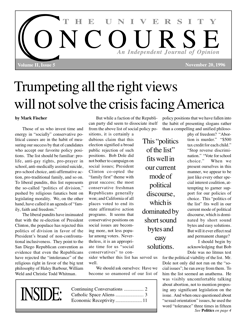Is corporate repentance really possible?
by David Bradshaw
I read with interest Mary Healy’s article on corporate contrition in Issue 4. As a non-Catholic (Orthodox) Christian, I necessarily approach this subject as something of an outsider. While commending Ms. Healy’s good intentions and those of the Pope in his encyclical, I would like to voice a few misgivings.
First, much of what Ms. Healy recommends, although laudable enough, does not really deserve the name of repentance. She says that Catholics today should “vicariously sorrow” for the sins of others in the Church and that they should express “sincere regret” for the crimes of Catholics in the past. Granting this to be so, I think it is important that we not name such acts repentance. Repentance involves more than an attitude of sorrow or regret; it involves actively resolving to change while at the same time placing one’s hope, not in one’s own ability to change, but in the mercy of God. There is no better illustration of this than the story of the prodigal son. The repentance of the prodigal son is inseparable from his act of physically returning to his father and casting himself upon his father’s mercy. Had he merely felt sorry for his sins without acting upon that sorrow, he would have remained lost.
It is worth noting that the New Testament marks this distinction by using two different verbs, metanoein and metamelesthai, for repentance and regret. Judas regretted (metameletheis, Mt. 27:3) his betrayal of Christ; he did not repent of his betrayal of Christ.
I realize that insisting on this point may seem pedantic. Why does it matter what we call what we do, provided that what we do is right? The answer is that if we call godly sorrow by the name of repentance then we are apt to forget what repentance truly is—how hard it is and how much it demands of us in the way of humility before God and true and fervent desire to change. Part of the reason why the sacrament of confession is so important is that it forces one to move beyond the stage of regret to that of effectual and lived repentance.
I have similar misgivings about another important element of Ms. Healy’s argument: the prayers she cites from the Old Testament. In these prayers Nehemiah and Daniel confess before God the sins of the nation and beseech Him for mercy. These are, as Ms. Healy suggests, excellent models for us to imitate. But are they really acts of corporate repentance? I would prefer to call them prayers of intercession. They show us part of what it means to “bear ye one another’s burdens, and so fulfill the law of Christ” (Gal. 6:2). Corporate repentance, properly speaking, requires something else as well—a resolve on the part of the people to renounce their sins and return to God. It requires that the people pray as a body (though perhaps through a spokesman) for the mercy of God.
All of this makes it highly doubtful that the Church can really repent, as a body, of sins committed in ages gone by. Certainly she can express sorrow for them, but that is something different. Individual Christians can also make intercessory prayers of the type exemplified by Nehemiah and Daniel. What the Church can and should do as a body is repent of present sins. Unfortunately, that requires a certain unanimity in the recognition that these are sins and in the resolve to turn away from them. Given the present state of the Catholic Church, such unanimity is scarcely at hand. Even the Pope seems to have shied away from anything more specific than a vague call for repentance for (to quote Ms. Healy’s paraphrase) “our participation in the evils of our own modern culture.” Very well, but what are these evils? If I use artificial contraception and vote for pro-abortion politicians, am I participating in the evils of modern culture? Traditionalists will say yes; modernists will say no. That leaves us about where we started.
It seems to me—speaking, of course, as an outsider—that what is needed in the Catholic Church at present is not so much a grand but ambiguous call for repentance as concrete acts of reform. I could not help but notice throughout Ms. Healy’s article the assumption that non-Catholics today are alienated by memories of Catholic intolerance and bigotry. Although that may be true in some cases, among the Orthodox, at least, it is scarcely typical. We recognize that there is plenty of blame to go around and that our own slate is hardly a clean one. What alienates us are characteristics to be found in most Catholic parishes today—the lack of reverence for the Holy Eucharist, the Theotokos, and the saints, the neglect of disciplines like fasting and confession, the tawdriness and banality of most post-Vatican II worship, the dissent and even heresy among prominent Catholic theologians. I do not mean to say that if these were eliminated then the path would be clear for reunion; for serious issues would remain. But at the level of visceral reaction it is these, rather than the remembrance of ancient grievances, which today create the obstacle.
David Bradshaw
Dr. Bradshaw teaches philosophy at Indiana University Northwest.


